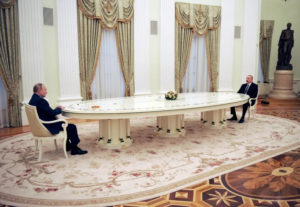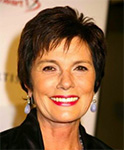Putin Before He Retreated to the Far End of the Table by Maureen Orth (Colombia)
Thanks for the excellent article, Maureen. Having served in the mid-1990s in the Peace Corps in Russia, I witnessed the…
Putin’s Character Was Clear Long Before He Retreated to the Far End of the Table
By Maureen Orth (Colombia 1964-66)
Vanity Fair Magazine March 4, 2022

Russian President Vladimir Putin meets Azerbaijani President Ilham Aliyev in Moscow, Russia on February 22, 2022
•
Today, the world sees Vladimir Putin from a distance, isolated at the end of a very long table. When I first met him, in September 2000, he was at a very different table, in a private room at New York’s 21 Club, at a dinner hosted by Tom Brokaw for 20 or so media luminaries. Brokaw had interviewed the recently elected Russian president for NBC a few months earlier. I was invited because I had just closed a lengthy profile of Putin for Vanity Fair, and also because my late husband, Tim Russert, was the anchor of NBC’s Meet the Press.
The number one topic was why Putin had not interrupted his vacation when the Russian Kursk submarine sank, killing all 118 crew members. By then, Russians were fed up with years of his predecessor Boris Yeltsin’s often drunken antics, and Putin had quickly sought to impose order and restore government control over two media empires that were ruled by oligarchs he considered too independent. He was already making moves to eventually crush them. He’d also installed ruthless former KGB officials in key geographic “super zones” to supervise the unruly Russian parliament. Putin himself had won the presidency in no small part by promising to brutally eliminate separatists who had fought back in Chechnya, not entirely dissimilar to how the Ukrainians are fighting back today.
My head stuffed with facts about Russia after months of reporting out my Vanity Fair story, I immediately raised my hand when Brokaw said Putin would answer some questions. We had a back and forth about press freedoms that ended with Putin finally saying, “Who are you? Where are you from? Why did you not come to me personally to ask me these questions?” I pointed to his spokesman at the time, Alexey Gromov, sitting nearby. “I have been trying for four months to interview you and he always said no.”
A few months earlier, in June 2000, I had been present when President Bill Clinton, Secretary of State Madeleine Albright, and Clinton’s chief of staff, John Podesta, met Putin for the first time for bilateral talks on U.S.-Russian relations. The confab took place in the grand St. George Hall of the Kremlin, which had been freshly refurbished in Tsarist splendor. Clinton, who was buddies with Yeltsin, began a smiley, rambling talk that appeared mostly content-free. Meanwhile, the unsmiling Putin, who was very much prepared, sat by himself at his own table, dressed in a yellow-beige suit that matched both his complexion and demeanor. As Clinton went on, Putin, who slumped inattentively in his chair, began to drum his fingertips on the tabletop. Then they all retired to a smaller room with a conventional conference table, where some of us in the press were allowed to glimpse Putin presenting a bouquet of flowers to the American ambassador on his birthday. Later, at a carefully vetted press conference, Western journalists and Russian journalists sat apart and each group was allowed exactly four questions that had been submitted and chosen beforehand.
“Shock therapy” was the informal name of U.S. policy toward Russia in the 1990s. It was perpetrated by a group of Harvard professors led by Jeffrey Sachs and Andrei Shleifer, who were mentored by Larry Summers. Vice President Al Gore oversaw its implementation. The idea was to quickly replace the state-run economy with a free market one, but in practice the sudden removal of price controls and subsidies sparked hyperinflation, wiping out the savings of millions of ordinary Russians, and even causing starvation in some places.
I witnessed the hardship myself when I made my first reporting trip to Russia for Vanity Fair, in 1994, to chronicle the rise of the übernationalist politician and white supremacist Vladimir Zhirinovsky, who I discovered had been secretly sponsored by the ever-powerful intelligence services to siphon votes off from Yeltsin. Zhirinovsky sat down with me in front of a map of the world and circled the old Soviet empire, then blithely drew an arrow straight down through Iran and wrote across 11 time zones, “РОССИЯ”—Russia. “This belongs to us,” he said. “The U.S. can have North and South America, Europe can have Africa.”
When Sobchak faked a heart attack as prosecutors were closing in on him, it was Putin who got him spirited out of the hospital and onto a jet to Paris. Shortly after, Putin began his meteoric rise as Yeltsin’s handpicked successor, becoming the head of the KGB and then serving as prime minister before Yeltsin dramatically resigned on New Year’s Eve 1999. He won his first term as president in part thanks to a carefully calibrated P.R. campaign that portrayed him as a physically strong and powerful patriot. Years of shirtless horseback-riding and tiger-tagging ensued, as did the murders of journalists and dissidents. Yet we in the U.S. kept on looking the other way.
Obviously, appearances have always counted greatly to Putin and to Russia itself, to assuage its nagging sense of inferiority vis-à-vis the West. During the darkest days of Communism and the Cold War, no matter how many millions were suffering or starving inside the USSR, the Soviet Union always prized and promoted enterprises it could show off on the world stage: classical music and ballet, the circus, chess, the space program, Olympic athletes, stamps. All were part of the country’s first line of propaganda, side by side with its nuclear power and weaponry. So today, for Russia to once again be shunned as a pariah state, stripped of its ability to show its stuff on a global scale, not even able to compete in the Eurovision Song Contest, the ruble in free fall, its economy soon to be in tatters from sanctions, one wonders if Putin, who has been personally stripped of his own international judo honors, is too far gone now to even wonder if it was a mistake to move so precipitously on Ukraine.
With hindsight, it’s a no-brainer to say that the U.S. should have challenged Putin long before things got this out of hand. But 9/11 happened and we needed his air space. George W. Bush looked into his eyes and saw “his soul.” The Obama administration never fought back in any meaningful way when he threw USAID out of Russia in 2012 (he’d kicked the Peace Corps out a decade earlier), annexed Crimea in 2014, and invaded Syria in 2015.
Yet, for some longtime Russia hands, including Susan Reichle, a USAID director in Moscow from 1999 to 2003, the current catastrophe, even as Russia’s invasion levels Ukraine and brings untold bloodshed and suffering on millions, brings a measure of hope and optimism, even though there is no formal way to dislodge Putin. (Even the old Soviet Politburo could technically vote to oust its premier.) “The world uniting now against him is huge. The protests inside Russia now are real—people are not happy with him waging this war. Too much blood and treasure has already been lost because of this mad man. It is definitely going to weaken him.” Reichle says.

Maureen,
When I read any of your writings,
I learn so much. This article takes me to a new level!
Meg Goffredo
Escondido, CA
parent RPCV
Excellent article. Leave it to a Peace Corps Volunteer to delve into the psyche of this madman. Thanks for your in-depth explanation.
Thank you, Maureen. I too learn so much from your interviews,
Across the wounded world this most pithy post reached me in Japan and humbled me, my own modest contributions here, with its erudition and astute look down a dying superpower’s mad tyrant’s power play gone so egregiously awry. This platform continues to hold me in awe … with each trenchant post … after post. Arigato, Maureen!!! Eric Madeen/Yokohama wwwericmadeen.com
Thanks for your enlightened article. I learned alot about this poor excuse of a man. Keep telling the world .
Glad to see you still have the ability to see things others may miss…and a way to convey them. I tried getting VF to cover the 1989 San Diego Arts Festival which featured the reunification of the Faberge’ Eggs. You could have covered the negotiations and seen how close it came to not happening in a meeting with Malcolm Forbes. Be well.
Doug Byrns
RPCV Venezuela 65-67
Hi Doug: Thanks for reading and that must have been just before I joined VF!! What are you doing now?
Maureen
I also was in Medellin 1964-66 teaching in service uncertified high school math or science teachers through the University of Antioquia. We were a subgroup of four with the English teacher training ILCA program. I do not remember meeting you.
Thank you for your insights. I enjoyed your article.
Claude Case RPCV Colombia 1964-66
Thanks for the excellent article, Maureen. Having served in the mid-1990s in the Peace Corps in Russia, I witnessed the “shock therapy” you describe, which served to wipe out savings and pensions and collapse the ruble. Add to that the “privatization on steroids” which eliminated Russians’ safety net of employment and housing, and an increasing frustration with Yeltsin. Putin promised economic stability and security, and when he was appointed Prime Minister and then elected President, it was welcoming relief for probably a majority of Russians.